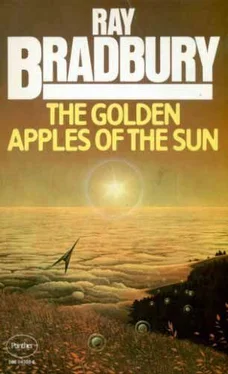A shower of warm rain shivered down upon them. The captain jerked his head right and left. "Can you see the trouble? Christ, don't stand there, we haven't time!"
The men rushed; the captain bent in the warm rain, cursing, felt his hands run over the cold machine, felt them burrow and search, and while he worked he saw a future which was removed from them by the merest breath. He saw the skin peel from the rocket beehive, men, thus revealed, running, running, mouths shrieking, soundless. Space was a black mossed well where life drowned its roars and terrors. Scream a big scream, but space snuffed it out before it was half up your throat. Men scurried, ants in a flaming match-box; the ship was dripping lava, gushing steam, nothing!
"Captain?"
The nightmare flicked away.
"Here." He worked in the soft warm rain that fell from the upper decks. He fumbled at the auxiliary pump. "Damn it!" He jerked the feed line. When it came, it'd be the quickest death in the history of dying. One moment, yelling; a warm flash later only the billion billion tons of space-fire would whisper, unheard, in space. Popped like strawberries in a furnace, while their thoughts lingered on the scorched air a long breath after their bodies were charred roast and fluorescent gas.
"Damn!" He stabbed the auxiliary pump with a screw driver. "Jesus!" He shuddered. The complete annihilation of it. He clamped his eyes shut, teeth tight. God, he thought, we're used to more leisurely dyings, measured in minutes and hours. Even twenty seconds now would be a slow death compared to this hungry idiot thing waiting to eat us!
"Captain, do we pull out or stay?"
"Get the Cup ready. Take over, finish this. Now!"
He turned and put his hand to the working mechanism of the huge Cup; shoved his fingers into the robot Glove. A twitch of his hand here moved a gigantic hand, with gigantic metal fingers, from the bowels of the ship. Now, now, the great metal hand slid out holding the huge Copa de Oro, breathless, into the iron furnace, the bodiless body and the fleshless flesh of the sun.
A million years ago, thought the captain, quickly, quickly, as he moved the hand and the Cup, a million years ago a naked man on a lonely northern trail saw lightning strike a tree. And while his clan fled, with bare hands he plucked a limb of fire, broiling the flesh of his fingers, to carry it, running in triumph, shielding it from the rain with his body, to his cave, where he shrieked out a laugh and tossed it full on a mound of leaves and gave his people summer. And the tribe crept at last, trembling, near the fire, and they put out their flinching hands and felt the new season in their cave, this small yellow spot of changing weather, and they, too, at last, nervously, smiled. And the gift of fire was theirs.
"Captain!"
It took all of four seconds for the huge hand to push the empty Cup to the fire. So here we are again, today, on another trail, he thought, reaching for a cup of precious gas and vacuum, a handful of different fire with which to run back up cold space, lighting out way, and take to Earth a gift of fire that might bum forever. Why? He knew the answer before the question. Because the atoms we work with our hands, on Earth, are pitiful; the atomic bomb is pitiful and small and our knowledge is pitiful and small, and only the sun really knows what we want to know, and only the sun has the secret. And besides, it's fun, it's a chance, it's a great thing coming here, playing tag, hitting and running. There is no reason, really, except the pride and vanity of little insect men hoping to sting the lion and escape the maw. My God, we'll say, we did it! And here is our cup of energy, fire, vibration, call it what you will, that may well power our cities and sail our ships and light our libraries and tan our children and bake our daily breads and simmer the knowledge of our universe for us for a thousand years until it is well done. Here, from this cup, all good men of science and religion: Drink! Warm yourselves against the night of ignorance, the long snows of superstition, the cold winds of disbelief, and from the great fear of darkness in each man. So: We stretch out our hand with the beggar's cup…. "Ah."
The Cup dipped into the sun. It scooped up a bit of the flesh of God, the blood of the universe, the blazing thought, the blinding philosophy that set out and mothered a galaxy, that idled and swept planets in their fields and summoned or laid to rest lives and livelihoods.
"No, slow," whispered the captain. "What'll happen when we pull it inside? That extra heat now, at this time, Captain?"
"God knows." "Auxiliary pump all repaired, sir."
"Start it!"
The pump leaped on.
"Close the lid of the Cup and inside now, slow, slow."
The beautiful hand outside the ship trembled, a tremendous image of his own gesture, sank with oiled silence into the ship body. The Cup, lid shut, dripped yellow flowers and white stars, slid deep. The audiothermometer screamed. The refrigerator system kicked; ammoniated fluids banged the walls like blood in the head of a shrieking idiot.
He shut the outer air-lock door.
"Now."
They waited. The ship's pulse ran. The heart of the ship rushed, beat, rushed, the Cup of gold in it. The cold blood raced around about down through, around about down through.
The captain exhaled slowly.
The ice stopped dripping from the ceiling. It froze again.
"Let's get out of here."
The ship turned and ran.
"Listen!"
The heart of the ship was slowing, slowing. The dials spun on down through the thousands; the needles whirred, invisible. The thermometer voice chanted the change of seasons. They were all thinking now, together: Pull away and away from the fire and the flame, the heat and the melting, the yellow and the white. Go on out now to cool and dark. In twenty hours perhaps they might even dismantle some refrigerators, let winter die. Soon they would move in night so cold it might be necessary to use the ship's new furnace, draw heat from the shielded fire they carried now like an unborn child. They were going home. They were going home and there was some little time, even as he tended to the body of Bretton lying in a bank of white winter snow, for the captain to remember a poem he had written many years before:
Sometimes I see the sun a burning Tree,
Its golden fruit swung bright in airless air,
Its apples wormed with man and gravity,
Their worship breathing from them everywhere,
As man sees Sun as burning Tree…
The captain sat for a long while by the body, feeling many separate things. I feel sad, he thought, and I feel good, and I feel like a boy coming home from school with a handful of dandelions.
"Well," said the captain, sitting, eyes shut, sighing. "Well, where do we go now, eh, where are we going?" He felt his men sitting or standing all about him, the terror dead in them, their breathing quiet. "When you've gone a long, long way down to the sun and touched it and lingered and jumped around and streaked away from it, where are you going then? When you go away from the heat and the noonday light and the laziness, where do you go?"
His men waited for him to say it out. They waited for him to gather all of the coolness and the whiteness and the welcome and refreshing climate of the word in his mind, and they saw him settle the word, like a bit of ice cream, in his mouth, rolling it gently.
"There's only one direction in space from here on out," he said at last.
They waited. They waited as the ship moved swiftly into cold darkness away from the light.
"North," murmured the captain. "North." And they all smiled, as if a wind had come up suddenly in the middle of a hot afternoon.
The Golden Apples of the Sun 1953( Золотые яблоки солнца)
Читать дальше
Конец ознакомительного отрывка
Купить книгу



![О Генри - Сестры золотого кольца [Sisters of the Golden Circle]](/books/415415/o-genri-sestry-zolotogo-kolca-sisters-of-the-gol-thumb.webp)




